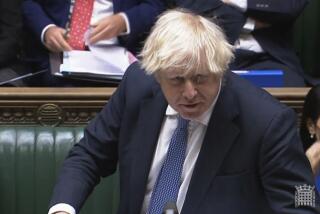Britain recognizes Libyan rebel council, expels Kadafi’s staffers
- Share via
Reporting from London — Britain has ordered the Libyan Embassy’s remaining staff members to leave the country and has recognized the Libyan rebels’ ruling council as the only official representative of the North African nation, Foreign Secretary William Hague told a televised news conference Wednesday.
The eight staff members will follow Libyan Ambassador Omar Jelban, who was expelled in May. Five other embassy personnel, including the military attache, were ordered out in March.
Hague stressed the British government’s support for the rebel Transitional National Council’s struggle to oust Libyan leader Moammar Kadafi, declaring: “The Libyan people can be assured that we will remain on their side for as long as it takes.”
“The prime minister and I have decided that the United Kingdom recognizes and will deal with the … council as the sole governmental authority in Libya,” he said in reference to Prime Minister David Cameron.
Although Britain has supported the rebel council’s cause by participating in NATO airstrikes against Libyan forces, it had not offered official recognition until Wednesday. Hague said the government’s decision reflected the united position of allies in the Libya Contact Group, which met recently in Istanbul, Turkey.
Hague also announced that frozen Libyan assets, including about $127 million belonging to Libya’s national Arabian Gulf Oil Co., would be released to pay for fuel and basic needs in rebel-held territory. The government also pledged to aid students in Britain who have been left high and dry by the conflict in their homeland.
There was widespread speculation Wednesday that the British decisions were at least in part a reaction to the appearance of Abdel Basset Ali Megrahi at a pro-Kadafi rally in Tripoli, the Libyan capital, televised Tuesday night. Megrahi was convicted in 2001 for his role in the 1988 bombing of Pan Am Flight 103 over Lockerbie, Scotland, which killed 270 people. He was released by Britain in 2009 after doctors said he was in the final stages of cancer and had only months to live, and he returned to Libya to a highly publicized homecoming.
Hague did not confirm that Tuesday’s appearance was behind the expulsion of diplomats but had fierce criticism of the previous British government’s decision to release Megrahi.
“I think the appearance of Mr. Al-Megrahi on our television screens is a further reminder that a great mistake was made when he was released.... This was absolutely the wrong thing to do; it shows the medical advice it was based on was pretty much worthless. I think many people, particularly the families of those killed at Lockerbie, I think their anger and outrage at this release will be further intensified by what we have seen.”
Stobart is a staff writer in The Times’ London bureau.
More to Read
Sign up for Essential California
The most important California stories and recommendations in your inbox every morning.
You may occasionally receive promotional content from the Los Angeles Times.










